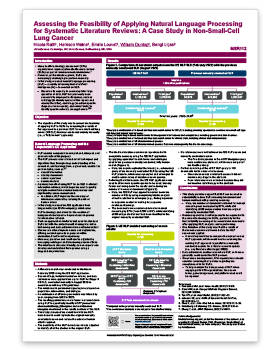
AstraZeneca achieves 7X faster SLR screen with IQVIA’s AI-Assisted Literature Review Solution
Reduced the time to find relevant study publications on non-small cell lung cancer from 20 days to less than 3, from millions of abstracts, for the initial screen of a Scientific Literature Review
Overview
AstraZeneca used IQVIA’s AI-Assisted Literature Review solution—powered by IQVIA Healthcare-grade AI™—to save significant time and resources when conducting the initial screen for a Systematic Literature Review (SLR), compared with traditional manual methods. With this solution, which uses IQVIA’s award-winning Natural Language Processing (NLP) platform, the pharmaceutical company reduced the number of documents selected for manual screening by 7-fold (from 4,736 to 617). In doing so, AstraZeneca found that it saved significant time by isolating a smaller set of potential studies for review, whilst including the same 38 studies they had identified as most relevant through their original manual search effort.
Considering that it typically takes 1-3 minutes to review an abstract, this reduction translates to a time saving of over 17 days (assuming 2 minutes per abstract, 8 hours per day). This efficiency demonstrates the transformative potential of NLP in addressing some of the challenges of systematic literature reviews.
What is an SLR?
SLRs are a cornerstone of health technology assessments (HTAs) and are essential for generating evidence that informs reimbursement decisions, policy recommendations, clinical guidelines and healthcare practices. These reviews aim to provide a comprehensive synthesis of all relevant studies on a particular health intervention, ensuring that the data are gathered in a transparent and reproducible manner.


The SLR process involves:
- Defining a clear research question.
- Systematically searching for relevant studies.
- Critically appraising study quality.
- Synthesizing findings to draw meaningful conclusions.
Despite their importance, conducting SLRs presents several challenges:
- Volume of Literature: Reviewing a vast number of papers to find relevant studies is both time-consuming and resource intensive.
- Comprehensiveness and Transparency: Ensuring the comprehensiveness and transparency of the review process requires rigorous methodological standards and expertise, which can be a significant burden for organizations conducting HTAs with limited resources.
- Variable Study Quality: The variability in the quality and relevance of the available studies can complicate the synthesis of evidence and the drawing of robust conclusions.
- Frequent Updates: The dynamic nature of medical research means that SLRs need to be regularly updated to incorporate new evidence, sometimes necessitating “living reviews.”
How Can We Help?
IQVIA’s AI-Assisted Literature Review Solution utilizes NLP, a rapidly advancing field of AI that enables more effective identification and extraction of critical insights from unstructured text. Based on its capacity to accurately filter large quantities of data, NLP has previously been successfully employed in disciplines, such as:
- Drug discovery (to identify gene-disease-biomarker relationships for translational research teams).
- Clinical trial design (to develop clinical endpoints from patient voice in social media, for early Parkinson’s disease).
- Outcomes research (e.g. publication monitoring for COVID-19, to keep teams up-to-date with vaccine safety and efficacy research).
In the AstraZeneca study, IQVIA’s AI-Assisted Literature Review Solution was used to develop a text-mining algorithm to rapidly identify papers with relevant trial results from ~35 million MEDLINE abstracts pertaining to non-small cell lung cancer, based on population, intervention, and trial type. The results were filtered by year, narrowed down further by two specific therapy types, and compared to a previous fully manual SLR. This methodology enabled the team to assess the extent to which the NLP-based search could accurately replicate the original manually conducted search and reduce the extent of human effort required.
Results
By using IQVIA’s AI-Assisted Literature Review Solution, AstraZeneca achieved:
- Seven-fold (87%) reduction in documents for screening: From 4,736 to 617.
- Complete study identification: All 38 unique studies identified in the manual review were successfully retrieved.
- Substantial time savings: Reduced screening time from 20 days to fewer than 3 days.
The study demonstrated that this solution, using IQVIA NLP, can substantially reduce SLR screening turnaround and human workload with comparable accuracy. AI can also assist the SLR process with data extraction, another time-consuming part of literature reviews. Human supervision is still expected to be required with the current technology for SLRs, particularly for the final screening, analysis, and report writing, however it shows great promise for AI assistance in this essential process.
Learn More
Discover how IQVIA’s AI-Assisted Literature Review Solution can optimize your SLRs.
- Read the full story here.
- Contact us at AppliedAIScienceInfo@IQVIA.com.

1Rath et al (2023). Assessing the Feasibility of Applying Natural Language Processing for Systematic Literature Reviews: A Case Study in Non-Small-Cell Lung Cancer. Value Health, vol 26, S414, MSR112 ;https://www.ispor.org/docs/default-source/euro2023/msr112rath-et-alispor-eu-2023131541-pdf.pdf
